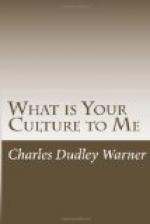The world, however, is not very much excited. The birth of a child is in itself marvelous, but it is so common. Over and over again, for hundreds of years, these young gentlemen have been coming forward with their specimens of learning, tied up in neat little parcels, all ready to administer, and warranted to be of the purest materials. The world is not unkind, it is not even indifferent, but it must be confessed that it does not act any longer as if it expected to be enlightened. It is generally so busy that it does not even ask the young gentlemen what they can do, but leaves them standing with their little parcels, wondering when the person will pass by who requires one of them, and when there will happen a little opening in the procession into which they can fall. They expected that way would be made for them with shouts of welcome, but they find themselves before long struggling to get even a standing-place in the crowd—it is only kings, and the nobility, and those fortunates who dwell in the tropics, where bread grows on trees and clothing is unnecessary, who have reserved seats in this world.
To the majority of men I fancy that literature is very much the same that history is; and history is presented as a museum of antiquities and curiosities, classified, arranged, and labeled. One may walk through it as he does through the Hotel de Cluny; he feels that he ought to be interested in it, but it is very tiresome. Learning is regarded in like manner as an accumulation of literature, gathered into great storehouses called libraries—the thought of which excites great respect in most minds, but is ineffably tedious. Year after year and age after age it accumulates—this evidence and monument of intellectual activity—piling itself up in vast collections, which it needs a lifetime even to catalogue, and through which the uncultured walk as the idle do through the British Museum, with no very strong indignation against Omar who burned the library at Alexandria.
To the popular mind this vast accumulation of learning in libraries, or in brains that do not visibly apply it, is much the same thing. The business of the scholar appears to be this sort of accumulation; and the young student, who comes to the world with a little portion of this treasure dug out of some classic tomb or mediaeval museum, is received with little more enthusiasm than is the miraculous handkerchief of St. Veronica by the crowd of Protestants to whom it is exhibited on Holy Week in St. Peter’s. The historian must make his museum live again; the scholar must vivify his learning with a present purpose.




